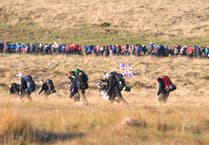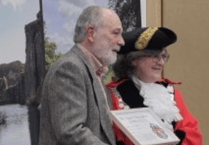Dartmoor farmer Mary Alford reflects on a positive start to spring and the summer months ahead.
WE have had fairly kind winter weather and a lovely dry April and nice spells in May.
We started lambing in the second week of April and it was bitterly cold at times, especially when going around the ewes on the quad bike early in the morning.
We started calving in the first week of May when it was still cold and wet. It was not enjoyable, especially for new born lambs and calves.
It made me realise again how valuable a crook in a hedge, a rock or even a small bunch of stinging nettles suddenly became as shelter to very young lambs and calves from the wind and rain. Everyone seems to have had a really good crop of lambs this season.
Travelling around the livestock four times every day to watch the ewes and cows as they lamb or calve brings you closer to nature. This year I heard our cuckoo come into full cry on April 20, being slightly later than last year.
Thankfully it returned again to its old habitat and didn’t get disposed of along its lengthy journey back to this country.
Calving continues at the moment although our cows and heifers were very slow to start. This can be a concern because due to the mild winter, the cows have kept themselves in good condition.
We need them not to carry too much weight while they are pregnant and grow the unborn calf to its normal size, to give an easy birth and to produce enough milk for her offspring. That’s the theory and it usually works.
However, there is always the unseen circumstance when a calf is being born with only one leg forward or coming out with its back end first. The same happens with lambs so then we have to quickly see the signs and intervene to help the cow or the ewe with the birth. It’s easier to help a ewe, being a smaller animal to handle. I also have my two trusted dogs that will catch a ewe to allow me to help lamb it, but a cow is slightly more difficult to handle.
Once a cow starts calving the hormones kick in — female, you know. It’s best to shut the dogs in their kennel and have a reliable quad bike and carry a stout waking stick and bring the cow to the handling facilities as soon as possible.
Calving a cow is not for wimps, you have to be strong to use calving pullies or ratchets to pull out the calf. If a Caesarean operation is needed a vet is called, so make a cuppa and wait for them to arrive.
Farm animal vet practices are getting few and far between now, we no longer have a farm animal practice in Tavistock so our nearest vets are either at Launceston, Callington, Ivybridge, Okehampton or Moretonhampstead. They’re not too close if an emergency occurs but they usually arrive fairly quickly.
TB is still a major problem for all farms and we now have extra regulations piled on us. A change of civil servants at the top of the regulatory body has decreed more regulations affecting the movement of our cattle on the commons and we have to try to get a fresh working relationship with a new DEFRA team.
This means going through the annoying situation of attending more meetings with the powers that be so that the new team understand the difficult work of gathering of our cattle from the high moor during the summer period to have an additional TB test.
This also gives us the extra problem of deciding where we hold them for nearly a week on the farm while the tests, which have to be four days apart, are taking place just when our fields are all laid up for hay and silage. This creates a major juggling act.
Road traffic accidents still continue to increase and on the Wotter common near Cadover Bridge, some very good new signs have been put on the road side in the shape of a sheep. I think they are really good because they show a running number of the total deaths, which really makes you think.
The other signs that stop you in your tracks are the flashing speed cameras. From January until the beginning of May the numbers are ten ponies and 27 sheep killed in RTAs on Dartmoor roads.
We must remember it’s not only livestock that loses their life but humans could do as well. I was shocked to see a recent report in the Western Morning News that a driver was boasting that with a good car it was safe to drive on the moor at over 100 miles per hour. This surely is an irresponsible attitude.
The Ten Tors Challenge made the moor very busy in May with the huge number of 2,500 participants taking part all taking to the moor. It is a very good exercise for young people to have the experience of walking on the wilds of Dartmoor.
However, I feel, like many others, that it is not so good because it is at the beginning of the bird nesting season, plus lambing, calving and ponies foaling.
How would we as humans feel about this huge disturbance? Imagine you were an animal getting ready to lay an egg or give birth in a chosen quiet spot to then have hundreds of people invade your privacy.
I think it would be much better to have the event later in the year when the young animals are grown up, on their feet and coping with day to day life. This later date has been the wish of the commoners on Dartmoor for a long time but it hasn’t happened yet.
Last year saw a particular disturbing incident at the start of Ten Tors when a dog, which was out of control, chased a ewe and her two very young lambs, splitting the family with one lamb being lost in a deep gully. Those sort of incidents make it difficult for the farmers to accept this huge event being held at this time of the year.
The month of May sees the Devon County Show and June the Royal Cornwall Show. Both are good opportunities to catch up with some old friends. This year in particular the Devon County Show brought our local prospective MPs out to attend and they were questioned on the future of Brexit.
We need to know how they will support the whole rural community and how they see the rural economy and communities coping with possible new import and export tariffs and restrictions on our beef and lamb sales.
This is something we are all concerned about and have on our minds but so far the political decisions seem to be a long drawn out affair with no one having any concrete answers. I suppose June 8 has to come and go before we get an idea of the direction we are heading in.
At least after the election all the government departments of DEFRA and the RPA will be back to work again. At the moment all decisions have been left in limbo with them not being able to answer any queries even on a day to day basis until after the election.
I would really like to know what these departments do in such times of ‘purdah’ as they do not seem to be working.
I hope I am wrong but I will give an example: on April 11 this year before the election was announced, a meeting was held with four DEFRA departments over new regulations on pony identification movements.
Following the meeting minutes of that meeting were due to be sent to attendees.
The minutes have never arrived from DEFRA and their excuse is that “the minutes could not be released until after the election due to purdah”. How that affects a set of minutes leaves all of us who attended completely baffled, after all said and done, the result of the election should not affect a true and correct record of a meeting.
The farming calendar year rolls on with summer work starting. Let’s hope that the good weather we are having — as I am writing this article — continues.
Of course in a perfect world, with some rain overnight at times - but you know what they say “farmers are never happy with the weather “ – it’s either too hot, too cold, too windy, too much rain, too dry and it all affects the land and livestock in different ways. At present I’m going to enjoy the feel good factor of the wonderful early summer sun in the same way as my animals - whilst it lasts.





Comments
This article has no comments yet. Be the first to leave a comment.